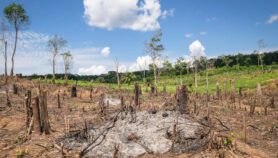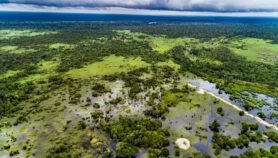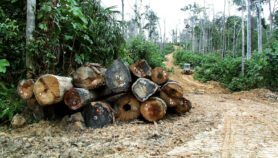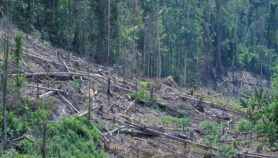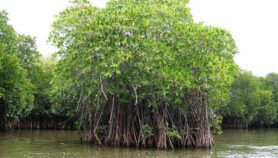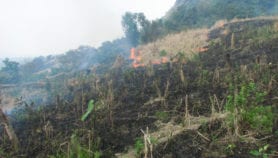12/11/21
Indonesia raises doubts about COP26 deforestation pledge
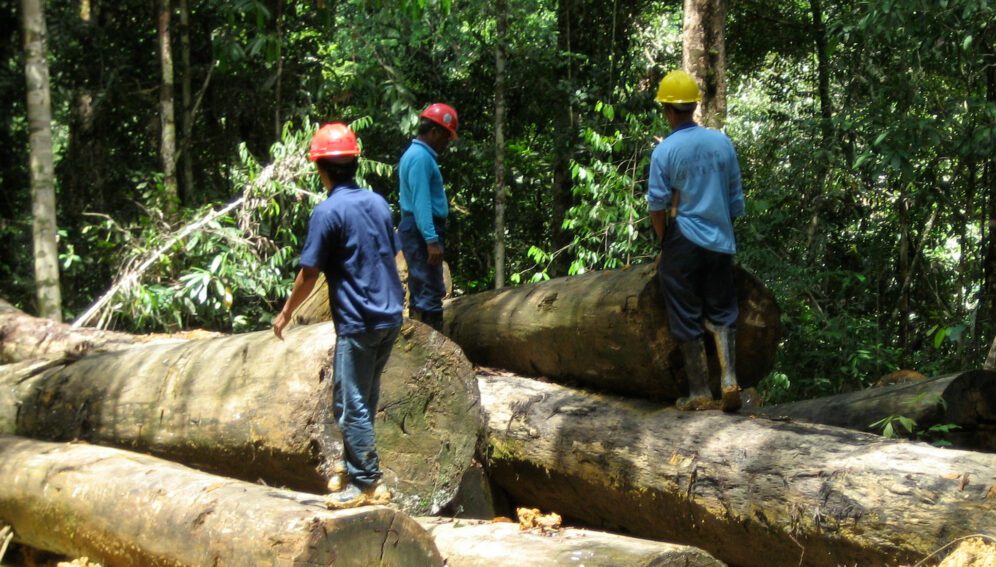
By: Clara Rondonuwu
Send to a friend
The details you provide on this page will not be used to send unsolicited email, and will not be sold to a 3rd party. See privacy policy.
[JAKARTA] Almost immediately after Indonesian President Joko Widodo signed a pledge to end deforestation by 2030, a tweet from his forestry minister, Siti Nurbaya Bakar, suggested that the country was stepping back from that pledge.
The deal signed by more than 120 countries on 2 November comes with US$19 billion of public and private funds, aimed at halting the felling of trees, a major contributor to climate change.
On 3 November, Bakar tweeted: “Massive construction in President Jokowi’s era must not be stopped on behalf of carbon emissions or deforestation.” She added: “Forcing Indonesia to zero deforestation in 2030 is clearly inappropriate and unfair.”
Pembangunan besar-besaran era Presiden Jokowi tidak boleh berhenti atas nama emisi karbon atau atas nama deforestasi.
— Siti Nurbaya Bakar (@SitiNurbayaLHK) November 3, 2021
The tweet, which was retweeted hundreds of times and quoted more than 10,000 times, sparked outrage among environmentalists who said it sent mixed signals to a multilateral climate deal.
“A shocking and very disappointing tweet,” Greenpeace senior forest campaigner Syahrul Fitra tells SciDev.Net. “Policymakers, especially the minister, should have a more protective approach towards the forest. Our campaign, which aims to push for a policy of saving the remaining natural forests, seems to have gone unnoticed by the Indonesian government.”
“Policymakers, especially the minister, should have a more protective approach towards the forest”
Syahrul Fitra, Greenpeace
Agus Sari, chief of Landscape Indonesia who is currently in Glasgow, Scotland, for the COP26 climate conference, however, doubts that the tweet was typed by the minister. “The language used is not diplomatic at all,” he says without further explanation.
Despite reaping controversy in the media, the tweet from the official handle of the Indonesian minister of environment and forestry, @SitiNurbayaLHK, had not been deleted. On 4 November, she tweeted again: “President Jokowi’s directive was very clear that the development carried out by the government must be in line with policies to reduce deforestation and emissions. There must be a balance.”
There are suggestions that this confusing message from Indonesia is related to its dissatisfaction with climate finance schemes.
In Glasgow, President Joko Widodo stated that 90 per cent of the global population live in extreme poverty and depend on forests. “Abusing climate change issues [by making them] a trade barrier is a big mistake that will erode trust in international cooperation.”
“Giving support doesn’t mean you can dictate, let alone violate a nation’s sovereignty — and the support given must match forest-owning countries’ needs,” he added.
Sari, who is an expert on REDD+ and forestry, brings up lessons from the collapse of the 2010 Indonesia-Norway emission reduction plan under which Norway was to pay Indonesia for reducing emissions from deforestation and forest degradation. In September, the Indonesian government terminated the deal citing non-payment of dues.
“In principle, there is nothing wrong with Joko Widodo’s statement. Nationally determined contributions must be determined by the state, not by donors,” Sari says. “To avoid things that have happened between Indonesia and Norway, it is better if international standards or bilateral standards are applied first.”
When Indonesia established a results-based payment collaboration with Norway, there was no methodology for measuring the baseline, no method for measuring emission reductions, and no benefit-sharing methodology (agreement on the distribution of monetary benefits from the commercialisation of forest carbon), Sari says.
Benefit-sharing, Sari adds, is important for results-based payments, especially those based on jurisdiction. “Why is it important? Because when it comes to reducing emissions, it’s not just one party that causes it.”
At COP26, the Indonesian President claimed that, in the last six years, Indonesia’s land-based emissions had fallen dramatically.
However, environmentalists argue that these statistics do not describe conditions proportionally because, in some provinces, deforestation has decreased but has increased sharply in other provinces such as Papua.
“A major threat now looms over Papua — the last bastion of Indonesia’s natural forests,” says Fitra.
According to a Greenpeace study, more than 900,000 hectares of forest areas are being released for oil palm plantations in the eastern province. About 200,000 hectares have been cleared so far. Greenpeace estimates that if the remaining areas were cleared, 71.2 million tonnes of carbon would be released.
In Papua, Greenpeace noted that out of the 32 companies that had obtained permits 25 were cited for “unprocedural forest release”. “The threat of deforestation is not just one factor — there are other factors such as corruption that go with it,” Fitra says.
This piece was produced by SciDev.Net’s Asia & Pacific desk.




